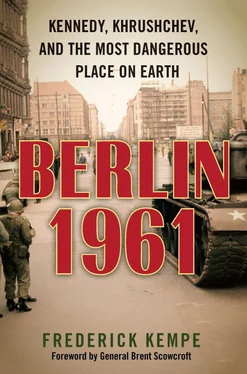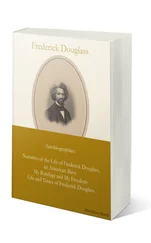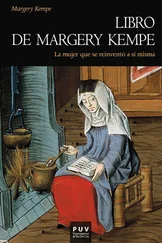Thompson had dispatched a damage-control cable to President Eisenhower and Secretary of State Christian Herter that same morning, relating Khrushchev’s remarks while at the same time declaring they should not be “taken literally,” given the Soviet leader’s intoxicated condition. He offered that the Soviet merely wished “to impress upon us the seriousness” of the Berlin situation.
A year later, and with Thompson safely at home, Khrushchev was in a more sober and generous spirit as the clock struck twelve. Following the bells welcoming the arrival of 1961, and the lighting of the forty-foot New Year’s tree inside St. George’s Hall, Khrushchev raised his glass and offered a toast that would be taken as doctrinal direction by party leaders and repeated in diplomatic cables around the world.
“Happy New Year, comrades, Happy New Year! No matter how good the old year has been, the New Year will be better still!”
The room exploded in cheers, embraces, and kisses.
Khrushchev ritually toasted the working people, the peasants, the intellectuals, Marxist-Leninist concepts, and peaceful coexistence among the world’s peoples. In a conciliatory tone he said, “We consider the socialist system to be superior, but we never try to impose it on other states.”
The hall grew silent as he turned his words to Kennedy.
“Dear Comrades! Friends! Gentlemen!” said Khrushchev. “The Soviet Union makes every effort to have friendly ties with all peoples. But I think no one will reproach me if I say that we attach great importance to improving our relations with the USA because this relationship greatly molds others. We would like to believe that the USA strives for the same outcome. We hope that the new U.S. president will be like a fresh wind blowing away the stale air between the USA and the USSR.”
The man who a year earlier had counted the atomic bombs he would drop on the West was striking a peacemaker’s pose. “During the election campaign,” Khrushchev told the crowd, “Mr. Kennedy said if he had been president he would have expressed regret to the Soviet Union” about sending spy planes over its territory. Khrushchev said he as well wanted to put “this lamentable episode in the past and not go back to it…. We believe that by voting for Mr. Kennedy and against Mr. Nixon, the American people have disapproved of the policy of Cold War and worsening international relationships.”
Khrushchev raised his refilled glass. “To peaceful coexistence among nations!”
Cheers.
“To friendship and peaceful coexistence among all peoples!”
Thunderous cheers. More embraces.
Khrushchev’s choice of language was calculated. The repetitive use of the term “peaceful coexistence” was at the same time a declaration of intent toward Kennedy and a message of determination to his communist rivals. Recognizing Soviet economic limits and new nuclear threats, Khrushchev, in his famous secret speech at the 20th Congress of the Communist Party in 1956, had introduced the new thinking that communist states could peacefully coexist and compete with capitalist states. His opponents, however, favored a return to Stalin’s more aggressive notions of world revolution and more active preparations for war.
As 1961 opened, the ghosts of Stalin endangered Khrushchev far more than any threat from the West. After his death in 1953, Stalin’s bequest to Khrushchev had been a dysfunctional Soviet Union of 209 million people and dozens of nationalities stretching over one-sixth of the world’s land-mass. World War II’s battles had depleted a third of the Soviet Union’s wealth and had left some 27 million dead while destroying 17,000 Soviet towns and 70,000 villages. That didn’t count the millions Stalin had killed previously through man-made famine and his paranoid purges.
Khrushchev blamed Stalin for then launching an unnecessary and costly Cold War before the Soviet Union had been able to recover from its previous devastation. In particular, he condemned Stalin for the botched Berlin blockade of 1948, when the dictator had underestimated American resolve and overestimated Soviet capabilities at a time when the U.S. still retained its nuclear monopoly. The result had been the West’s breaking of the embargo, then the 1949 creation of NATO and the founding in the same year of a separate West Germany. What accompanied that was an American commitment to dig into Europe for a longer stay. The Soviet Union had paid a high price because Stalin, in Khrushchev’s view, “didn’t think it through properly.”
Having extended the olive branch to Kennedy through his New Year’s toast, a still-sober Khrushchev at two a.m. took aside West German Ambassador Hans Kroll for a private talk. For Khrushchev, the sixty-two-year-old German was the second most important Western ambassador after the absent Thompson. However, the two men were far closer personally than Khrushchev was to the American envoy, connected both by Kroll’s Russian fluency and his conviction, not unusual for Germans of his generation, that his country was more closely connected culturally, historically, and potentially also politically to Moscow than to the U.S.
Accompanied by Deputy Premier Anastas Mikoyan and Presidium member Alexei Kosygin, Khrushchev and Kroll retreated to the same odd anteroom where the Soviet leader had threatened Thompson one year earlier. That year as well, Kroll had stormed out of the New Year’s celebration in protest after the Soviet leader used his toast to condemn West Germany as “revanchist and militaristic.”
This time, however, Khrushchev was in a seductive mood, and he summoned a waiter to pour Kroll Crimean champagne. While nursing a light Armenian red wine, the Soviet leader explained to Kroll that under doctor’s orders he was not drinking vodka or other hard drinks. Kroll savored such personal exchanges with Khrushchev, and it was his practice at such moments to draw him near physically and speak in hushed tones to underscore their closeness.
Kroll had been born four years later than Khrushchev in the then Prussian town of Deutsch Piekar, which in 1922 would be ceded to Poland. He learned his first Russian while fishing as a boy on the river that divided the German and Czarist empires. His first two years as a diplomat in Moscow had come in the 1920s when post–World War I Germany and the new communist Soviet Union, then two of the most vilified countries in the world, struck the Rapallo agreement that broke their diplomatic isolation and formed an anti-Western, anti–Versailles Treaty axis.
Kroll’s view was that European hostilities could only be calmed through an eventual accord enabling West Germany and the Soviet Union—“the two most powerful countries in Europe”—to get along better with each other. He had worked in that direction since leading the East–West trade department of the Economics Ministry in 1952, when West Germany was only three years old. His convictions had brought him into frequent conflict with the United States, which remained wary that too cozy a relationship could open the way to a neutral West Germany.
Khrushchev thanked Kroll for his help the previous autumn in getting West German Chancellor Konrad Adenauer to approve new economic agreements with the communist world, including the renewal of an East–West German trade accord, which had been interrupted a few months earlier. Though East Germany was the Soviet client, Khrushchev considered West Germany to be of far greater importance to the Soviet economy, due to the unique access it provided him to modern machinery, technology, and hard-currency loans.
So the Soviet leader raised his glass in a toast to what he called the Federal Republic of Germany’s remarkable postwar reconstruction. Khrushchev told Kroll that he hoped Chancellor Adenauer would use his growing economic strength and thus greater independence from the U.S. to distance himself from Washington and further improve relations with the Soviets.
Читать дальше











